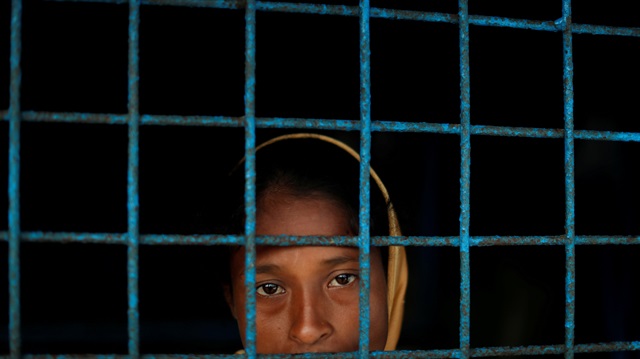
The conflict in Myanmar’s restive Rakhine State is more about Rohingya-phobia than Islamophobia, said a leading French academic and historian.
Since Aug. 25, around 589,000 Rohingya have crossed into Bangladesh, according to the UN.
The refugees are still fleeing a military operation in which security forces and Buddhist mobs have killed men, women and children, looted homes and torched Rohingya villages.
“It’s more about Rohingya-phobia than Islamophobia. Despite the violence of the last weeks, there were no riots throughout the province and no revenge attacks anywhere in the country,” Jacques Leider of French Institute of Asian Studies told Anadolu Agency in an interview via email.
He said the current events underscored more than ever the need for communal peace, noting that polarized perceptions seem more effective and “firmly entrenched”.
“Internationally, Myanmar is seen as trying to defend something that cannot be argued about because it concerns human rights violations; internally, the Buddhist community feels threatened by a global alliance of Muslim states and organizations,” he added.
He highlighted the colonial background of the conflict, which he said, was entirely forgotten. “The demographic gap between the rapidly growing Muslim community and the Buddhist Rakhine community is ignored as a driver of tensions throughout the last decades.”
- Loss of citizenship right
“Obviously there has been, and it has been largely emphasized, a systematic marginalization of the Rohingya Muslims that goes back to the 1970s. The loss of citizenship rights is but one aspect,” he added.
He also blamed international media for one-sided coverage.
“Most of the international media [Western and Middle East] have not been interested in the historical complexity of the issue, but only in the humanitarian situation and human rights’ violations of the Muslim community claiming the Rohingya identity. So, the key word in the media narrative on this particular conflict has not been communal peace, but justice for the Rohingya Muslims."
Since independence in 1948, there has been a communal strive that has kept Buddhist-Muslim relations at a constant low, he noted.
“International media reflect this conflict only as a simplified binary issue: racist Buddhist state with local support against helpless Muslims. However, this is only one aspect of a complex political reality,” he added.
He said, as the details and the complexity of the conflict remains poorly known and as the international media have generally sided with the moral cause of the Muslim victims, the dominant narrative of the conflict has barely changed over the last five years.
“The result is that Myanmar feels misunderstood and the Rohingya still lack any support within the country,” he stated.
- Turkey's aid campaign
Drawing on the army’s fears about the situation, he pointed out: “The army sees national security as its main task and the driver is geopolitical rather than religious.”
On Turkey’s aid campaign to Myanmar, he stressed: “Turkey’s competence to act in such a field need not be questioned. Turkey and Myanmar look back on centuries of historical experience of tolerant coexistence of religious groups. But both countries had also experiences that disprove this noble heritage.
“So, Turkey should be able to empathize with Myanmar at a time when things have turned bad,” he concluded.
Rohingya, described by the UN as the world's most persecuted people, have faced heightened fears of attack since dozens were killed in communal violence in 2012.
Last October, following attacks on border posts in Maungdaw, security forces launched a five-month crackdown in which, according to Rohingya groups, around 400 people were killed.
The UN documented mass gang rapes, killings -- including of infants and young children -- brutal beatings, and disappearances committed by security personnel. In a report, UN investigators said such violations may have constituted crimes against humanity.














